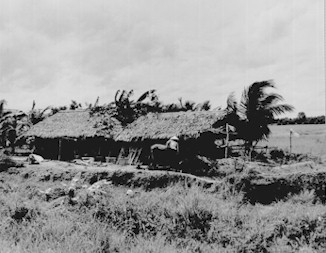
Search
Squandering Political Capital
and Goodwill
by Ingrid Naiman
![]()
During one of the long nights of marshall law, there was a bang on my door and a man standing there saying that he had a received a radio message that an embassy car with license plate number *xyz*xyz would be fetching me at 6:00 in the morning and taking me to a briefing and then Tan Son Nhut. I was to have a suitcase packed. Since I knew nothing about this, I was curious but there was no way to get more information unless something more came in via the radio.
The Vietnamese driver came as scheduled and took me to the embassy where I was told that I would be going to Paris and carrying some photographs of atrocities that would help the negotiations at the Paris Peace Talks. Because of student rioting, Orly Airport was closed so I would be traveling on a diplomatic letter instead of passport. It was such an unusual and memorable experience that I have kept that letter. Basically, it stated that the President of the United States orders everyone shown the letter to provide whatever assistance I required. I didn't even know such letters existed and it was, to be honest, quite exciting to carry such a letter. The print is in gold and it's really impressive.
I was told that it was imperative to get to Paris as quickly as possible and to use my ingenuity about how I was to achieve this. They had me booked as far as Bangkok. An embassy car would come out on the runway in Bangkok and whisk me away to explain the next step. I was told I had the right to demand cars, helicopters, airplanes, anything I needed in order to get to Paris as quickly as possible. The diplomatic letter and my bundle of photographs were never to leave my possession and they had conspicuous large writing on them that made everyone certain I was a spy.
In Bangkok, I learned that the pilot of the plane, PanAm if my memory is right, would radio when over Teheran, to determine whether to go to Rome or Frankfurt from Beirut. I was to be in the cockpit with the captain when he was on the radio.
Another embassy car met me in Beirut and we went first to the flight to Rome and then to the Frankfurt one and back again and finally Frankfurt it was. Not being the capital of Germany, there was only a consulate in Frankfurt and the staff was not prepared the way the Thai and Lebanese embassies had been. I ended up going to Brussels and driving to Paris, and if I had been in competition with David Niven, I feel quite certain he and his balloons would have made it faster than I.
The crisis at the Peace Talks was that the U.S. was losing the propaganda war and some emergency something or other had to be invented to salvage the situation. The Peace Talks were almost the personal baby of Ambassador Lodge and they were not going well.
![]()
As you might recall from the earlier essays, the Rand Corporation was involved in studies of what motivates soldiers to fight . . . or to defect or surrender. I also referred to the impact of reporting on popularity for war or loss of public support for administration objectives.
In essence, what happened in the Vietnam "conflict" was that the tables were turned. My personal opinion is that the war could never have been won because the prerequisites for victory were absent. Even if there had been a determined effort to win, it would still have been impossible because we, the U.S., were losing the propaganda war.
The battle had many fronts. In Vietnam proper, the irrefutable argument was that Vietnamese were not dropping bombs on Washington, D.C., so why is the U.S. dropping bombs on Hanoi? If one respects the sovereignty of nations, then there is never a justification for an offshore military operation, and such operations are therefore doomed to failure. Of course, one can inflict incredible damage on structures: airports, harbors, roads, and even hospitals, schools, and temples, but this massive destruction only breeds hatred and strengthens the resolve to deal with what is regarded as evil by innocent victims.
In wars, the vast majority of people are innocent. Ordinary people do not pick up arms and challenge strangers living on the other side of an ocean to mortal combat. Most people pay attention to matters closer to home. They are concerned with employment, health, and family, the very same issues that form the backbone of political campaigns. What is happening in Vietnam or Afghanistan is of little interest to 99.9% of Americans. It is politicians and sometimes ambitious generals who make wars, and they know that wars are always costly and that the innocent pay those costs. They also know that widows and orphans never forgive them for the losses they have suffered so propaganda has to be invented to justify the price paid for war. This is even more critical to the soldiers themselves because low morale makes for poor combatants. As we have learned from the disenfranchised veterans of the Vietnam conflict, it is not only the enemy that does not forgive, but our own soldiers, many of whom lost body parts or function or buddies in war, also do not forgive commanding officers or politicians for their losses. When these people return home, they become political liabilities. In the case of the Soviet invasion of Afghanistan, dissidence brought down an entire country and broke it into 16 pieces.
![]()
War is expensive. It is costly in many ways. It deflects funds from domestic projects, such as roads and education, to foreign vanities. If the war cannot be won for a small price and big rewards, it becomes unpopular. If the measures used to prosecute the war are disapproved, our traditional allies lose the support they need at home to supply the backup needed to make private enterprises look like international campaigns.
 |
This happened during the Vietnam conflict. The U.S. became very unpopular abroad and politicians became unpopular at home. It is happening now, and this is a significant comparison to Afghanistan. The U.S. was never more popular than on September 11th, and it has been losing support with every new and excessive initiative. |
Capital punishment is banned in Europe so our insistence on military tribunals and secret trials of prisoners is regarded as illegal by many in Europe—uncivilized and illegal—and some of our treaties, as for instance with France, would actually be voided by such trials and sentencing.
The continuation of bombing after the new Afghan regime, our own puppet regime, requested a cessation of bombing is considered brutal and excessive by allies, not to mention more biased observers. The threats made by our administration against other countries has become a form of terrorism not easily ignored by peace-loving persons in countries dubbed the axis of evil or accused of harboring fugitive Al Qaeda members or terrorists. In a Gallup poll, only 9% of the Islamic world, 1.2 billion persons, believed that the US had any pretext at all for its bombing of Afghanistan.
There are many in foreign countries who do not believe the official accounts of what happened on September 11th and many who do not support the measures being used to crack down on terrorism. Credibility is an important political asset and one that is not easily recovered if lost.
![]()
I believe the current war lost more support in half a year than the Vietnam conflict lost in its first six years. The Gulf of Tonkin incident was reported in the summer of 1964, by a new administration, headed by a Texan whose claim to the presidency was always shadowed by the assassination of the popular John Kennedy. By 1967-8, the U.S. was becoming very unpopular in Europe but the flower children and public demonstrations against the war did not bring the conflict to a halt for yet several more years.
In the present case, unpopularity in Europe began with the refugees, the lack of adequate humanitarian relief. It got worse when the bombing seemed overzealous and when prisoners were taken to Guantanamo Bay and threatened with human rights violations and secret trials. In terms of support, we have already lost our popular base in Europe. Of course, there are still politicians committed to maintaining their strategic alliances, but the popular base has been eroded. In this country, it has not slipped as far or as fast, but we are not getting news.
 |
And why do we not get news? One reason is that contrary to what is probably believed, news is not really discovered by roving reporters who happen to be in an interesting place at the exact moment of an event. News is gathered at briefings and aired. Reporters travel with politicians and armies and are shown what they are supposed to see. They report what they are permitted to know and with a few exceptions here and there, independent reporting is a figment of the imagination. Between network ownership and policies—and governmental influences—we do not get much real news. |
I know a little about this, not much, but the tedious briefings by Ari Fleisher from the White House remind me a great deal of similar briefings in Saigon. We would discuss something amongst ourselves, come up with the substance for a briefing, meet with the reporters from all the newspapers, answer a few token questions in evasive ways, and then dismiss the press. The reporters would go back to their air conditioned hotel rooms, write up their reports and walk across the street to the telegraph office to send their stories. In most cases, they hadn't seen or heard anything they weren't supposed to see or hear. Of course, an enterprising reporter might always find a story on his or her own, but his paper or station may or may not print the story.
A few weeks after 911, Christiane Amanpour of CNN had a meeting with a representative from Reuters and one from the Washington Post. She asked when it would be safe to ask why 911 happened. The answer from one of the journalists was that he had already written the story but it wouldn't be featured so long as the other stories were selling so much copy.
It was soon after this that I happened to flip past C-SPAN late at night and catch the British Foreign Secretary Jack Straw giving a press briefing. He casually mentioned that the campaign in Afghanistan had been planned at an international meeting in July. I thought, "Oh, my, how is he going to get his foot out of his mouth now?" As it turned out, he put his foot there deliberately so as to appear congenial and informative because The Guardian already had the story, and they got it from Germany which got it from India. Straw went on to explain that future leaders had been considered and he actually divulged some names, this long before Hamid Karzai became the acting head. Soon thereafter Tony Blair was hotly defending the British role in Afghanistan before a Parliament that was livid over secrecy and apparent human rights neglect. The Prime Minister maintained his calm and focused on British objectives which he tried to cloak in palatable guises.
![]()
War isn't humanitarian so even if a blanket or tent or meal is sent to a camp, there are still incalculable casualties: lives and limbs, dislocation, property damage, and perhaps most grievous of all, the misplaced force that robs individuals of the opportunity to unfold their creativity and seek fulfillment in life in peaceful and supportive circumstances. It is always a crime to deprive people of their right to safety and to opportunities to be themselves without fear or risk.
In the current situation, such deprivation of opportunity is occurring on a wider and wider scale so that even if schools and hospitals are promised for the future, these are being offered to people who have lost family members and perhaps also the health required to persevere given the hardship of their situations. Even in the short run, the losses amount to incalculable suffering and they translate into significant population reduction.
While surrendering our own freedoms at a galloping pace, we are being told that we must fight to preserve our freedom. For this, we must be prepared to sacrifice some comfort. Under most circumstances, each of us is, in fact, capable of adapting to a certain amount of inconvenience, but the truth is that no one genuinely adapts to loss of life and the break up of family. This is what happens in war.
War is an action undertaken by people who cannot resolve issues in a civilized way. It has no place in the modern world. It never produces harmony, only dislocation. Yes, certainly we can argue until the end of time about how Gandhi would have addressed Hitler if axis powers had been the yoke he was trying to overthrow in India, but I seriously doubt war proves anything more than who can be king of the hill for the moment. I get the feeling that a lot of politicians have not outgrown this childish game and they want to impose it on others.
![]()
A curious thing about secrets and misuse of power is that they come to haunt the perpetrators of the disinformation. Today, "news" is the same as when I was in Vietnam. It is an opportunity to make a political statement consistent with government objectives. Watch Ari Fleisher or any of the others doing their jobs. The hidden agenda remains hidden, but disclosure always comes. Whether the cat gets out of the bag because of a leak such as prompted Jack Straw to exhibit unusual candor when addressing the press or because of the Freedom of Information Act or the labors of an Oliver Stone is not for me to say. Fate has its way. Secrets do not necessarily protect national security; they merely hide the truth. When the truth differs too significantly from stated facts, the public is unforgiving. Ergo, disingenuous propaganda is ultimately politically fatal, but removing veils and facing disillusion with our system is extremely painful, even if occasionally necessary.
Copyright by Ingrid Naiman 2002

Poulsbo, Washington
Copyright by Ingrid Naiman 2002, 2006, 2009, 2014